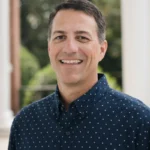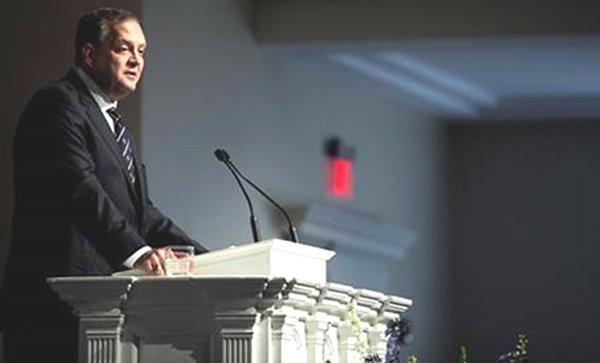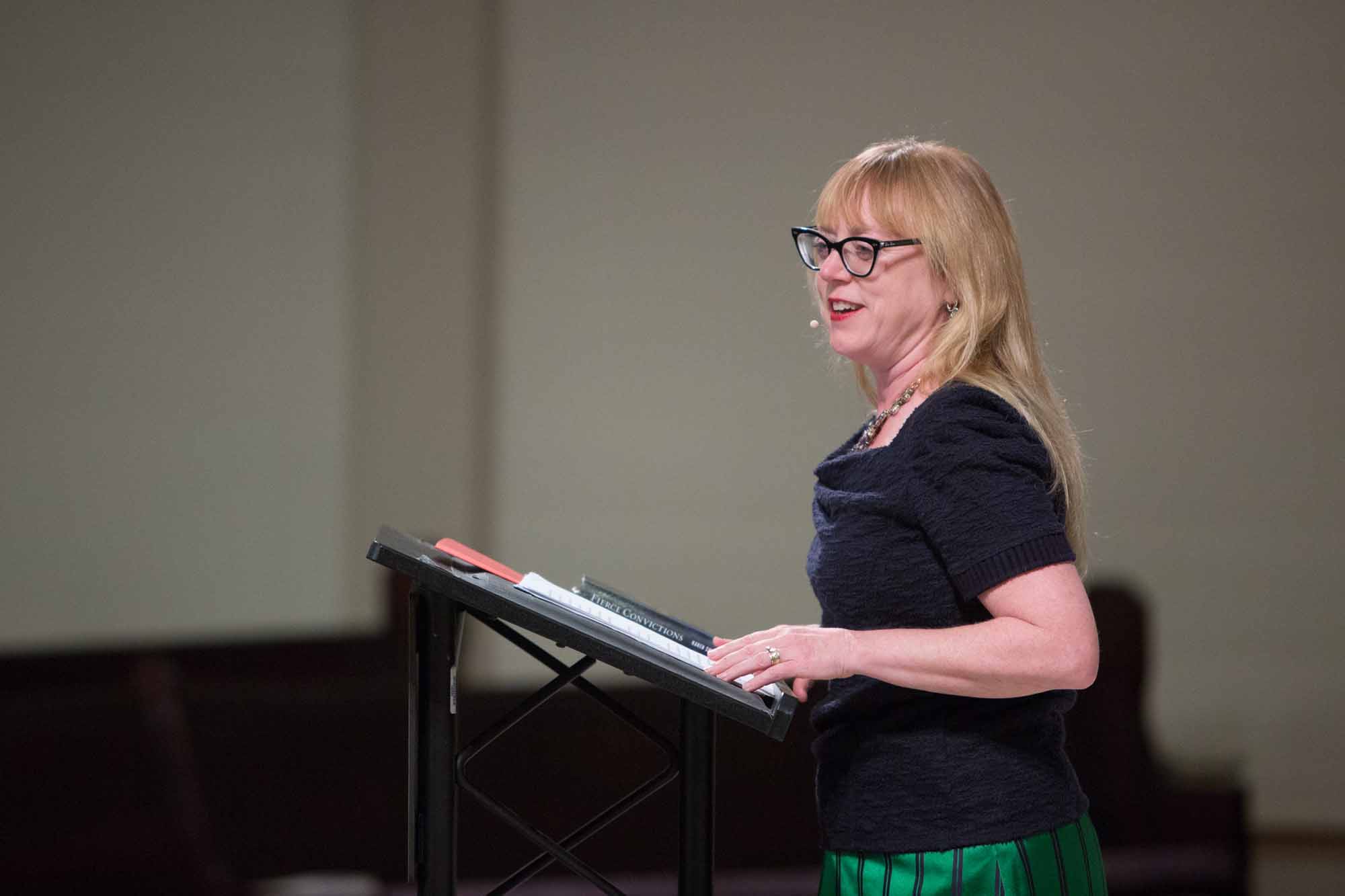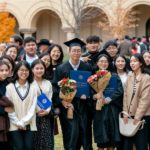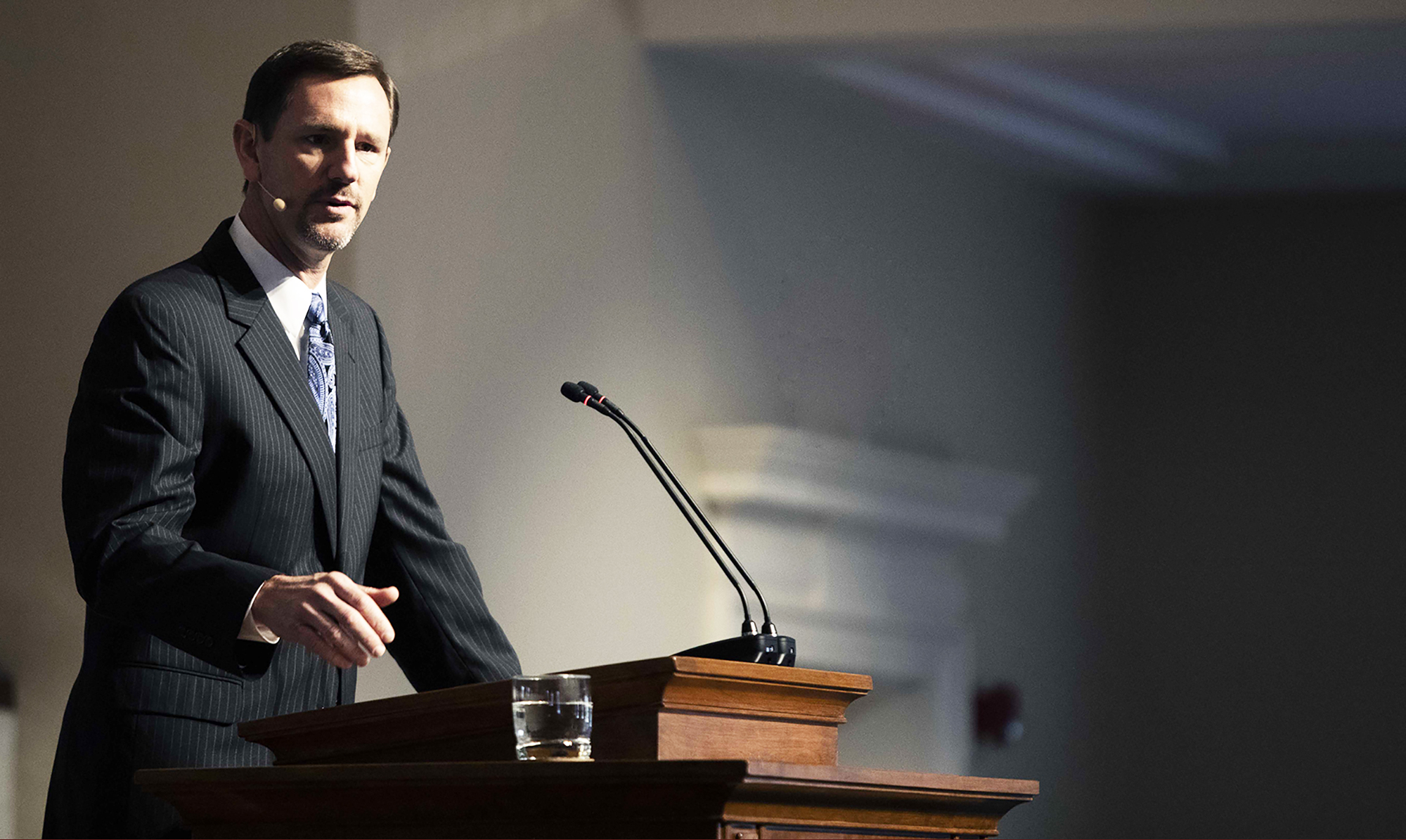
In today’s From the Seminaries:
Southern Baptist Theological Seminary
Southeastern Baptist Theological Seminary
Southwestern Baptist Theological Seminary
SBTS notes ‘most diverse’ faculty additions during convocation
LOUISVILLE, Ky. (BP) — Southern Baptist Theological Seminary President R. Albert Mohler Jr. has announced “the most diverse group of faculty ever to come to Southern Seminary at one time.”
Mohler introduced the five new faculty members for the 2018-2019 academic year as part of the opening convocation service Aug. 21 for the seminary and its undergraduate Boyce College: Curtis Woods, Lilly Park, Dominick Hernandez, Shane Parker and Amy Crider.
Three of the new faculty members are minorities; two of the new hires are women.
“I’m glad Southern Seminary is a healthy growing institution that needs to add faculty, and that both Southern Seminary and Boyce College are the kinds of schools drawing this quality of faculty,” Mohler said following the convocation. “It’s a sign of our investment in the future and it’s a sign of God’s blessing on His church … [and] a sign of the Kingdom for which we are very grateful.”
The new faculty members will teach in various disciplines across the seminary and Boyce College.
Woods, who is joining the faculty as assistant professor of applied theology, also is the Kentucky Baptist Convention’s associate executive director for convention relations, a position he has held since 2012.
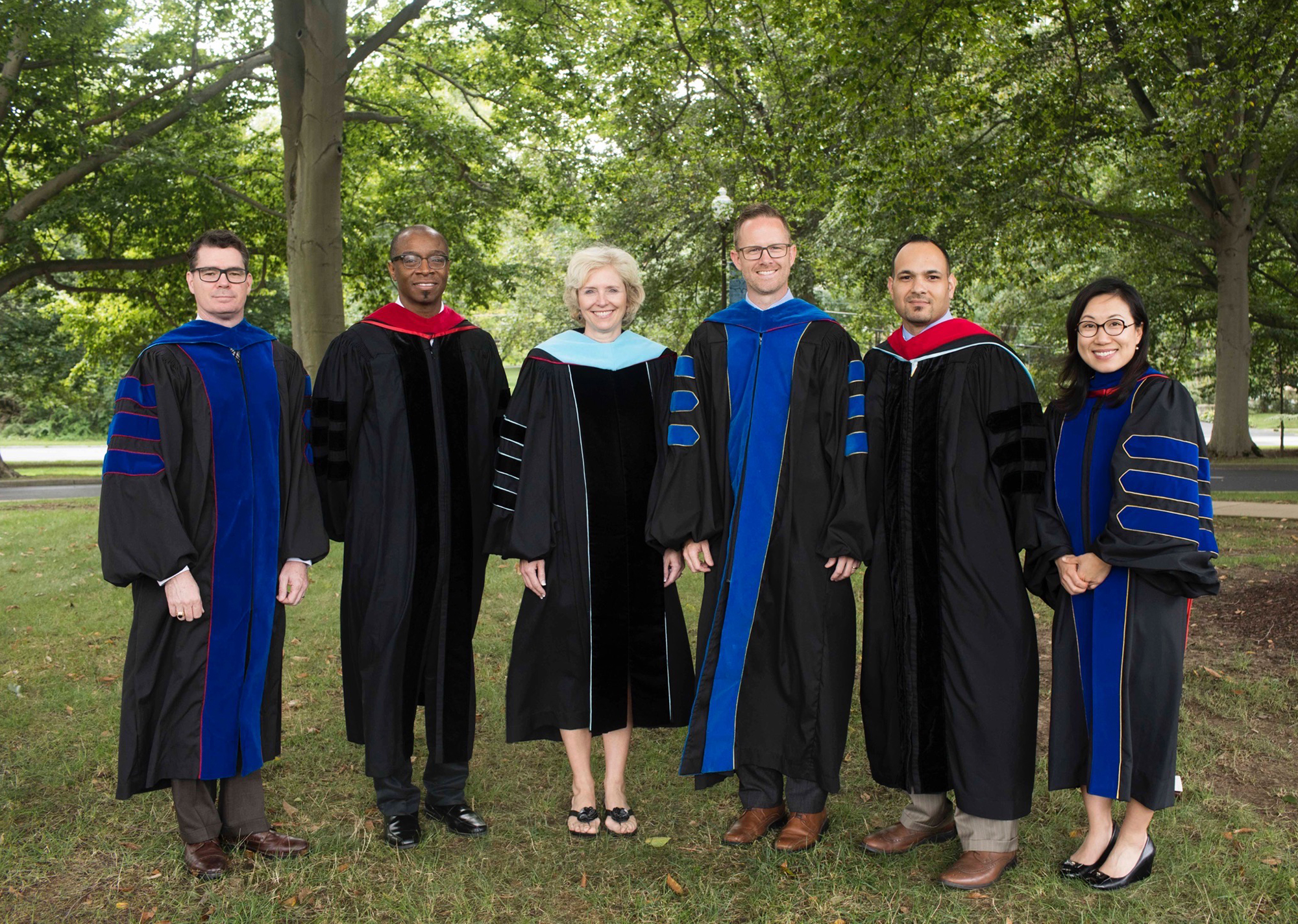 Woods previously was the Baptist campus minister at Kentucky State University in Frankfort and had a variety of responsibilities at Oak Cliff Bible Fellowship in Dallas from 2001-2006. Woods is the coauthor of the recently released book “Gospel in Color.” He has earned two degrees from Southern Seminary: a Ph.D. and Th.M., both in May of this year.
Woods previously was the Baptist campus minister at Kentucky State University in Frankfort and had a variety of responsibilities at Oak Cliff Bible Fellowship in Dallas from 2001-2006. Woods is the coauthor of the recently released book “Gospel in Color.” He has earned two degrees from Southern Seminary: a Ph.D. and Th.M., both in May of this year.
“Curtis Woods brings a great combination of intellectual strength and pastoral giftedness that I’m eager for our students to experience in the classroom,” said Randy L. Stinson, the seminary’s provost.
Woods said he looks forward to serving “alongside men and women who love the Gospel and the Lord’s church,” Woods said. “I am certain my interactions with staff, students and faculty will provide opportunities to lean on the Gospel and the community of faith. I pray my interactions with others will be marked by kindness and joy.”
Lilly Park, joining the faculty as assistant professor of biblical counseling, has been an assistant professor of biblical counseling at Crossroads Bible College in Indianapolis since 2011 and an adjunct instructor for Boyce College since 2013 and an online instructor at Cedarville University and Southern Seminary since 2016.
In 2017, Park also worked as a project consultant for Joni & Friends and has been extensively published on issues of race and family ministry. She is a council board member with the Biblical Counseling Coalition and has earned two degrees from Southern Seminary: a doctor of philosophy in 2015 and master of divinity in 2008.
“As a female faculty member,” Park said, “this moment is particularly meaningful to me and I’m honored to be a part of this historical institution in training men and women for ministry. I look forward to equipping students for ministry challenges by approaching life problems with biblical wisdom. Life is complex, but Christians know true hope found in Christ and true change made possible by His Spirit and Word. It is exciting to discuss the practicalities of these truths for life and ministry, with thoughtfulness and grace.”
Dominick Hernandez will serve as assistant professor of Old Testament interpretation and director of the seminary’s Hispanic online program, which offers M.A. and M.Div. degrees entirely in Spanish.
Hernandez has been assistant professor of Bible at Moody Bible Institute’s campus in Spokane, Wash., since 2016, previously serving as an adjunct professor at the Israel College of the Bible in Israel from 2014-2016. He earned a Ph.D. from Bar-Ilan University in Israel in 2016 and an M.Div. from Princeton Theological Seminary in 2011.
“My family is elated to be here in Louisville, Ky., and we are so blessed with the opportunity to be part of what The Southern Baptist Theological Seminary is doing here in Kentucky and, through the Global Campus, around the world,” Hernandez said.
Shane Parker, as associate professor of leadership and missions, already has been working at the seminary as director of professional doctoral studies since 2016. He previously was lead pastor at Midlands Church in Columbia, S.C., from 2014-2016 and pastor at Crossroads Church in Columbia from 2011-2014.
Parker earned a Ph.D. from Southern Seminary in 2007, after receiving an M.A. degree from Columbia Biblical Seminary in Columbia and an M.Div. from Southeastern Baptist Theological Seminary in Wake Forest, N.C.
Parker noted, “Both the current global reach of Southern Seminary and the storied tradition of faculty scholarship and teaching for the sake of the church make the opportunity to serve on this faculty a uniquely humbling honor. It is particularly meaningful to teach alongside faculty who have shaped my own vocational life and, by extension, the lives of the churches and academic institutions that I have been privileged to serve. I teach to strengthen the churches represented by our students, and in so doing champion the fulfillment of the Great Commission.”
Amy Crider, as assistant professor of English at Boyce College, has served as the Writing Center coordinator for Boyce College and Southern Seminary since 2011 and has taught English courses adjunctly at Boyce College since 2012.
“Never have I been on a campus with such esteemed and respected professors,” Crider said. “To be asked to join this faculty is an honor, a privilege and a stewardship.”
Crider earned a doctor of education degree from Southern Seminary in 2017, previously an M.A. in English in 1987 at Miami University in Oxford, Ohio. She is married to Joseph Crider, Southern Seminary’s Ernest and Mildred Hogan Professor of Church Music and Worship.
In his message at the convocation Aug. 21, Mohler noted that in a world marked by mere talk, the seminary community should be known for the power of personal transformation and fruitful ministries.
In a technologically saturated environment, it is easy to assume the talk of social media and online discourse represents reality, Mohler said, but reality is more grounded in “the power of the Gospel and the Word of God.”
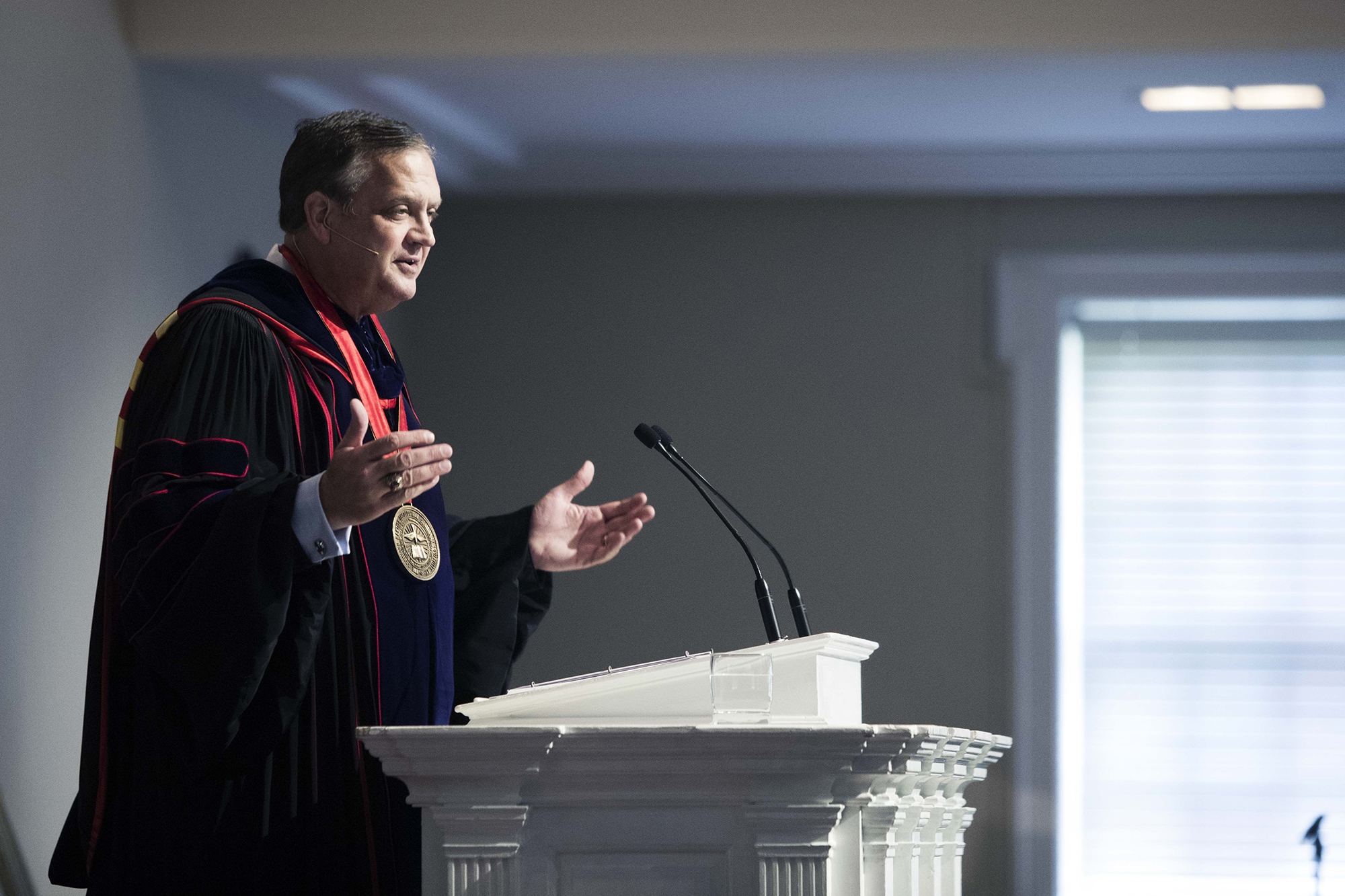 Mohler preached from 1 Corinthians 4:20 in an address titled “For the Kingdom of God Does Not Consist in Talk, but in Power.” In the apostle Paul’s two letters to the Corinthians, he responded to a group of false teachers called the “super apostles” who disrupted the preaching of the Gospel by drawing attention to style instead of substance.
Mohler preached from 1 Corinthians 4:20 in an address titled “For the Kingdom of God Does Not Consist in Talk, but in Power.” In the apostle Paul’s two letters to the Corinthians, he responded to a group of false teachers called the “super apostles” who disrupted the preaching of the Gospel by drawing attention to style instead of substance.
These teachers split the church into factions, Mohler noted, diverting attention from the Gospel and onto themselves through a “gospel of power.”
“The danger of factionalism is very central to Paul’s concern … the slick preachers who showed up in Corinth — and their gospel of power,” Mohler said. “The apostle Paul’s predicament is that they appeared to be more powerful preachers than he.
“The apostle Paul says, ‘I don’t want any preaching other than the preaching of the cross. That is the message of salvation for those who are being saved. It may be a stumbling block for the Jews and foolishness for the Greeks, but that’s all I’m going to preach.”
Drawing from the larger context of 1 Corinthians, Mohler noted that Paul’s claim is not about his powerful rhetoric but instead about the power of the cross. Whereas the super apostles used fancy words, eloquence and powerful personalities to gain a following, Paul’s ministry was not driven by the empty words but the content of the powerful message.
Similarly, contemporary society is enamored with talk, Mohler said. On social media and the internet, it seems that people are noteworthy only because they say something — not because they do much of anything.
“These days, one political leader, one cultural leader, one sports figure can put out 140 characters and the world acts like the axis of the entire planet has been shifted,” Mohler said. “We’re surrounded by talk: talk shows, talk TV, talk radio, Twitter, podcasts, YouTube. There’s good in the mix, to be sure, but the mix is often not good.
“Here’s the reality of the new digital media age: Anybody can talk and evidently, everyone does.”
This obsession with talk is not limited to the secular world, Mohler said. Charisma and attractiveness are the calling cards of the prosperity gospel movement. Figures like Jesse Duplantis — a televangelist who asked his followers to donate more than $50 million to fund a new private jet — have constructed massive followings upon their smooth words. But there’s no evidence to support all their claims, Mohler said. Genuine conversion and sanctification is one of the best evidences of true power, he said. And this transformation is what should mark institutions like Southern Seminary and Boyce College.
Words nevertheless are an important component of any decent education, Mohler said — not to mention any explanation of the Gospel. But the fruit of one’s seminary education is not ultimately demonstrated in words, but in the Spirit-driven power of changed lives. If one follows the logic of Paul, Mohler said, the proof of true Christianity is the tangible evidence of what the Word of God does in the hearts of people.
“The kind of power we’re looking for is the power of consecrated teaching, preaching and learning such that we are changed by the Word of God, conformed to the image of Christ,” Mohler said.
The evidence of real power is not located on the campus of Southern Seminary, he noted, but in the churches where graduates preach and in the world where they serve.
As part of the convocation service, four professors newly elected to the faculty during the spring trustee meeting signed the Abstract of Principles, the seminary’s confession of faith. This year’s signees were Jeremy L. Pierre, Lawrence and Charlotte Hoover Associate Professor of Biblical Counseling; John David Trentham, associate professor of leadership and discipleship; Melissa Tucker, associate professor of elementary education at Boyce College; and Jarvis J. Williams, associate professor of New Testament interpretation. The Abstract of Principles is the founding document of Southern Seminary and has been signed by full professors at the institution since 1859.
Mohler also introduced two new members of the seminary’s board of trustees: Nat Millican, a former lieutenant colonel in the Air Force and captain for UPS Airlines, and Bradley Rushing, senior pastor of Mt. Gilead Baptist Church in Dothan, Ala. Millican is executive director of Unbridled Skies in Fisherville, Ky., which provides leadership training and mentorship for small- and medium-sized churches. Rushing has been senior pastor of Mt. Gilead Baptist Church since 2008.
Audio and video of the convocation are available at equip.sbts.edu.
**********
Southeastern, with 10th faculty chair, honors Charles Page
Southeastern Baptist Theological Seminary installed Charles Quarles to its 10th faculty chair, the Charles Page Chair of Biblical Theology, during its Aug. 16 convocation. The chair was announced in 2003 while Page was still living, but it was not until 15 years later, with more than 100 donors, that the endowed chair became active.
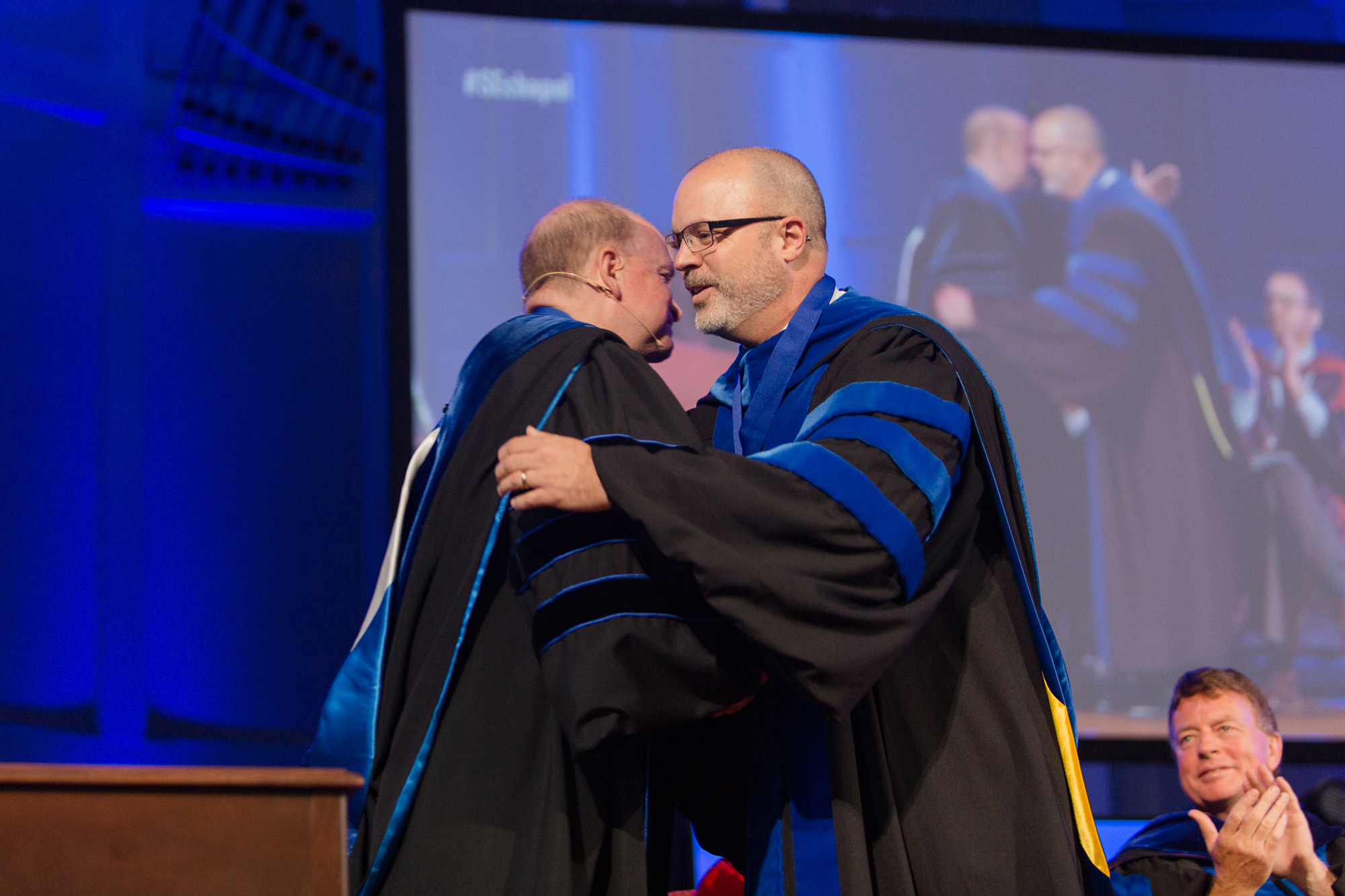 “It brings great, great joy in my heart to know that until Jesus comes again, one of his choice servants will be honored at this institution, and rightly so,” Akin said during a lunch following convocation to honor Page and his family.
“It brings great, great joy in my heart to know that until Jesus comes again, one of his choice servants will be honored at this institution, and rightly so,” Akin said during a lunch following convocation to honor Page and his family.
Jack Fallaw, longtime friend of Page, spoke of the late pastor’s influence and godly example.
“You couldn’t be around Charles very long that you didn’t see there was a power in him that was greater than himself,” Fallaw said.
Akin spoke to the tremendous influence Page had on his life, calling him “one of my heroes.” He gave three reasons why he admired Page: Akin learned how to love his family, Page taught him on a public level and he taught him on a one-on-one level.
Quarles, SEBTS research professor of New Testament and biblical theology, received his Ph.D. in New Testament and Greek and M.Div. from the Memphis-area Mid-America Baptist Theological Seminary. He served as a senior pastor for 10 years in Mississippi and Tennessee and spent time as an International Mission Board missionary in Bucharest, Romania. Before coming to Southeastern, Quarles served as a professor at multiple schools, including Clear Creek Baptist Bible College, the Bucharest Baptist Theological Seminary, the University of Bucharest, New Orleans Baptist Theological Seminary and Louisiana College. Quarles is also the author of multiple publications.
Page, who died in 2005 after a nine-year battle with cancer, received both his doctor of ministry and M.Div. degrees from Southeastern. He was widely influential from leading churches in North Carolina, South Carolina and Tennessee. From 1982-1985, he was pastor of First Baptist in Charlotte; he left to serve as pastor of First Baptist in Nashville before returning to First Baptist Charlotte in 1991, where he grew the congregation to 3,500 members.
He was instrumental in many lives through broadcasting his sermons on television from First Baptist Charlotte and delivering weekly devotionals to hundreds of businessmen whom the church would host for lunch.
During the convocation, Scott Pace, associate professor of pastoral ministry and preaching and associate director of SEBTS’ Center for Preaching and Pastoral Leadership, was installed in the Johnny Hunt Chair of Biblical Preaching, which began in the fall of 2010.
Adrianne Miles and Tate Cockrell, newly elected faculty members, signed their names to the Baptist Faith & Message 2000 and the Abstract of Principles. Miles is an assistant professor of English and linguistics for The College at Southeastern; Cockrell is an associate professor of counseling and assistant director of the seminary’s doctoral ministry program.
Akin, preaching from Psalm 117 in his convocation message, highlighted how the life and ministry of missionary John Paton (1824-1907) coincided with the message presented in the shortest chapter in all of Scripture.
Paton, Akin told the audience, was a man “who risked his life and sacrificed much that a tribe of murderous cannibals in the New Hebrides Islands might praise the Lord for His steadfast love and faithfulness that endures forever.”
First, Akin explained that Psalm 117:1 states that the Lord is to be magnified among the nations, being praised and extoled by people of every ethnicity.
“These people groups are perishing and headed toward hell with no Gospel witness,” Akin said, “and yet our great God desires that they would praise Him and be saved.” Second, he noted, the Lord is to be magnified because of His nature, which is steadfast and faithful, he said.
To view photos from convocation, go to flickr.com/photos/southeastern/sets/72157699924370644.
**********
Interim president shares dream for SWBTS in coming academic year
FORT WORTH, Texas (BP) — In his first address to the student body as interim president of Southwestern Baptist Theological Seminary, D. Jeffrey Bingham set forth three virtues that should characterize every Southwesterner: self-denial, taking last place and orienting one’s entire life around serving others.
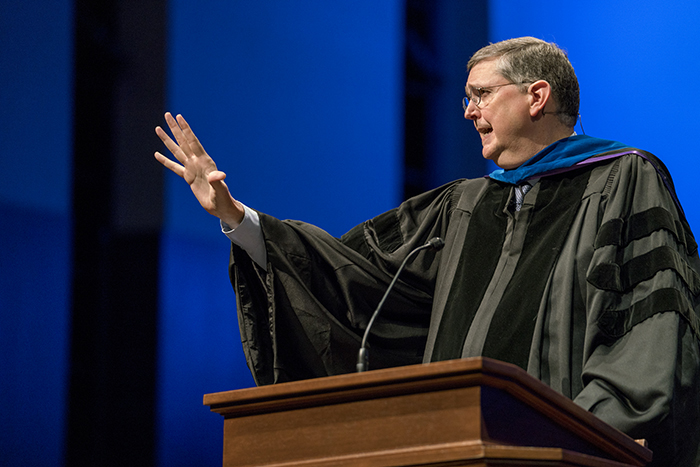 Bingham, speaking during the fall convocation Aug. 23, preached three different passages from the Gospel of Mark (8:31-35; 9:30-35; 10:32-45) in which Jesus refers to Himself as the “Son of Man,” a reference to the prophetic vision of the coming Messiah in Daniel 7. Contrary to that vision, however, in all three instances Jesus referred to the suffering He would endure.
Bingham, speaking during the fall convocation Aug. 23, preached three different passages from the Gospel of Mark (8:31-35; 9:30-35; 10:32-45) in which Jesus refers to Himself as the “Son of Man,” a reference to the prophetic vision of the coming Messiah in Daniel 7. Contrary to that vision, however, in all three instances Jesus referred to the suffering He would endure.
When teaching this to His disciples, Bingham noted, they misunderstood Jesus’ words and instead sought “power and glory, kingdom and dominion” as they understood it from Daniel 7. In response, Jesus each time clarified the role of His disciples, noting that they must deny themselves, take last place and orient their lives around serving others.
“There is an order to the Son of Man’s experience,” Bingham said. “First comes the cross, the suffering, the betrayal and the death, and then after all of that comes the resurrection with its glory and with its honor. This is the model for your life and for mine.
“We are living in the time before our own resurrection,” Bingham continued. “I promise you on the authority of the Word of God that the day is coming in which the Lord Jesus will return with the blare of a trumpet and the dead will rise. And I promise you that on that day, if you are buried in your grave, you will rise to life and you will be transformed from being mortal to immortal.
“But prior to that day, your life is to be characterized not by the pursuit of glory and honor, victory or abundance, kingdom or dominion, lording it over others. Your life is to be characterized by three virtues: denial of self, taking last place and orienting your entire life around being the servant of others.”
Bingham shared that his dream for Southwestern this academic year is for Southwesterners to be known by these three virtues. “Everywhere I go throughout the [Dallas-Fort Worth] metroplex and throughout the nation and overseas,” he said, “I want to hear these words: ‘We can always tell a Southwesterner because she always denies herself.’ ‘We can always recognize a Southwesterner because he always takes last place.’ ‘You know how we know that he is from Southwestern? Because his whole life is consumed with serving us.’
“Southwesterners, the cross doesn’t just do something for you by forgiving you of your sins,” Bingham concluded. “The cross should do something to you — it should transform your heart into a heart that is consumed with denying yourself, with taking last place, and with serving others.”
During convocation, Carl Bradford, the seminary’s new instructor in evangelism, was introduced. Bradford comes with experience in several ministry positions and an M.Div. from Southwestern in 2011. He plans to complete his Ph.D. from Southwestern this semester.
A campus-wide “Lunch on the Lawn” fellowship followed chapel. Information about Southwestern’s chapel program can be accessed at swbts.edu/chapel.

